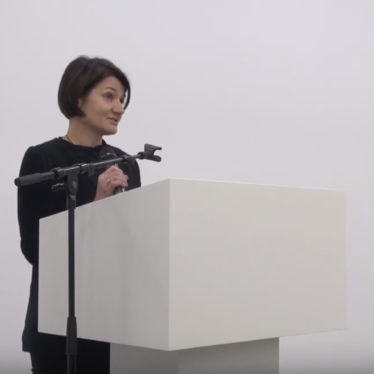Crisis is a term increasingly heard these days – climate crisis, migration crisis, crisis of representation, identity, masculinity… Contemporary societies often react to crises by installing mechanisms of classification and order. Identitarian communities perceive themselves as an antidote to personal and social crises.
On 14 and 15 November 2019, the symposium «Crisis and Communitas. Performative Concepts of Commonality in Art and Politics» took place at the Migros Museum für Gegenwartskunst in Zurich. The goal of the SNSF research project team was to ask how crises bring about movement and the transgression of borders – be they social or racial, cultural or political, state or institutional borders. Thus, we invited to think about new forms of communitas, of inclusionary bonding across discursive borders. Instead of searching for common traits, it embraces diversity and difference through the interaction of bodies and their communicative performativity. Migration, shifting contexts and bodily movement are explored as a trajectory of self-empowerment and agency. Crisis frames new political utopias.
In three panels, we were exploring the aesthetics and politics of commonality, the way bodies and affects constitute the commonal power, and how knowledge migrates in the context of arts. The programme included presentations by an international group of researcher and was accompanied by a keynote lecture by Susan Buck-Morss as well as the screening of the film Via Carpatia (2018).
CRISIS AND COMMUNITAS
PERFORMATIVE CONCEPTS OF COMMONALITY IN ART AND POLITICS
*
SYMPOSIUM
NOVEMBER 14 & 15, 2019
MIGROS MUSEUM FÜR GEGENWARTSKUNST, ZÜRICH
event hall, Limmatstrasse 270, 8005 Zurich
PANEL 1: AESTHETICS AND POLITICS OF COMMONALITY
November 14, 13:00 to 17:45
Introduction – Dorota Sajewska (Zurich)
1. Potent Collectivities: Aesthetics of Solidarity – Jeremy Gilbert (London)
2. Speculative Communities: Designing Contact Zones in Times of Eco-Eco-Crisis – Malgorzata Sugiera (Krakow)
3. Crisis of Communitas or the Extension of «Our» World – Nina Seiler (Zurich)
Discussion 14:45 to 15:15
4. The Avant-Garde of Destitution – Mikkel Bolt (Copenhagen)
5. How Attitudes Escape Form – Adam Szymczyk (Zurich)
Discussion 17:00 to 17:45
KEYNOTE
YEAR 1 INTERPELLATES REVOLUTION TODAY
BY SUSAN BUCK-MORSS (NEW YORK)
November 14, 18:30 to 20:00
MORNING LECTURE
Sharing Image, Sharing Time by Paweł Mościcki (Warsaw)
November 15, 9:00 to 10:15
Discussion 9:45 to 10:15
PANEL 2: BODIES, AFFECTS AND THE COMMONAL POWER
November 15, 10:30 to 13:00
1. Divided We Stand or Revolutionary Love in the Making – Katarzyna Bojarska (Warsaw)
2. Inventing Skins. Reinventing Community – Eduardo Jorge de Oliveira (Zurich)
3. Affective Community. Towards a Performative Theory of Historical Agency – Dorota Sajewska (Zurich)
4. Polish Transformation: Community Crisis and Question of Ephemerality in Arts – Dorota Sosnowska (Warsaw)
Discussion 12:30 to 13:00
PANEL 3: MIGRATION AND REDISTRIBUTION OF
KNOWLEDGE IN ARTS
November 15, 14:00 to 18:15
1. Emotional Identification and Abjection – Mieke Kolk (Amsterdam)
2. We refugees and we the people – Tadeusz Koczanowicz (Warsaw/Zurich)
3. La Commune (Paris, 1871) – Fabienne Liptay (Zurich)
Discussion 15:30 to 16:00
4. Crisis and Communitas in Southern Italian Tarantism – Anja Dreschke (Frankfurt) & Michaela Schäuble (Bern)
5. «The function of art is to do more than tell it like it is: it’s to imagine what’s possible» – Marc Streit (Zurich)
6. Interactive archive of communitarian thinking – Sandra Biberstein (Zurich)
Discussion 17:30 to 18:15
EVENING SCREENING
VIA CARPATIA (PL, CZE, MKD 2018) – 75’
With an introduction/discussion by Kasper Bajon (Fuerteventura)
November 15, 18:45 to 20:30
Piotr and Julia have been planning their holiday for months. Unfortunately their plans are ruined by Piotr’s mother: she wants to bring home Piotr´s father, who has been staying for months at one of the refugee camps on the Macedonian-Greek border. Despite his strong doubts Piotr agrees to take the challenge. And so instead of an all-inclusive holiday, the couple embarks on a tiring journey to the South, during which they will have to answer some fundamental questions…
